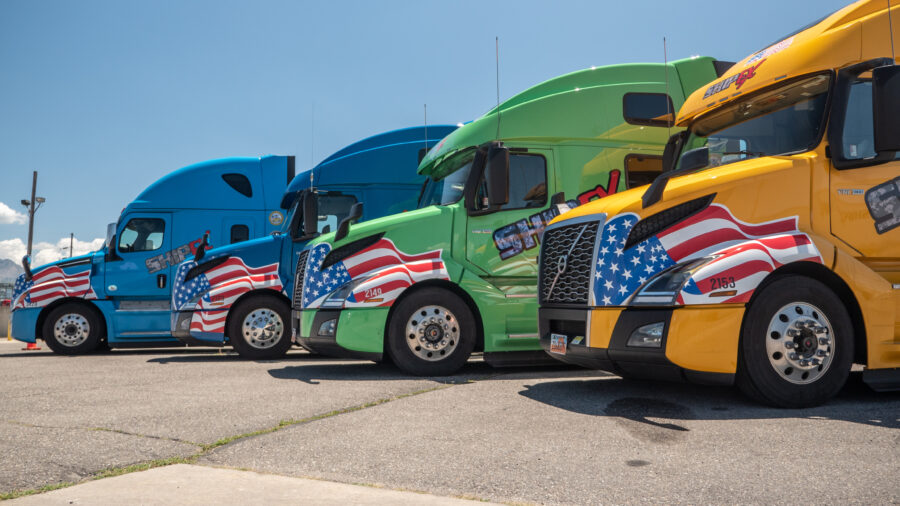Pursuing a career in truck driving begins with understanding how to get a CDL (Commercial Driver’s License), a crucial step that validates your ability to operate heavy vehicles safely and responsibly. The process involves a series of steps that include meeting specific eligibility requirements, understanding the various CDL classes, and successfully passing both written and practical driving tests. This guide is designed to provide clear and concise information on each of these steps, ensuring that individuals looking to enter the trucking industry are well-prepared for the journey ahead.
Choosing the right truck driving school is a critical decision in this process. A quality school not only prepares you for the CDL exam but also equips you with the skills necessary for a successful career in trucking. When evaluating schools, consider factors such as the experience of instructors, the comprehensiveness of the training programs, and the availability of hands-on driving practice. A good truck driving school will offer a balanced curriculum that covers both the theoretical aspects necessary for the written exam and the practical skills required for the road test, setting a solid foundation for your truck driving career.
How to Obtain Your CDL:
CDL Eligibility Requirements
Before you dive into the process of obtaining your CDL license, it’s important to know if you meet the eligibility requirements set by your state. The majority of states have specific prerequisites that applicants must meet before applying for a CDL. These requirements often include:
- Age: In most states, you must be at least 18 years old to apply for a CDL license. However, if you plan to engage in interstate operations, you’ll need to be at least 21 years old.
- Residency: Many states require you to be a resident of the state where you’re applying for a CDL for at least one year. Meeting this residency requirement ensures you have a solid connection to the state.
Understanding these eligibility requirements is the first step in planning your career as a commercial driver and can save you potential CDL license fees associated with unsuccessful applications.
Acquiring a CDL Learner’s Permit
After confirming your eligibility, the next step is to obtain a CDL learner’s permit, which allows you to practice driving a commercial vehicle under certain restrictions while you prepare for the CDL skills test. This process generally involves:
- Written Exam: You’ll need to pass a written exam evaluating your knowledge of traffic laws, road signs, and safety regulations. Success on this exam is vital as it ensures a strong foundation in the rules of the road, saving you from potential retake costs.
- Identity Verification: Routine identity verification procedures are part of the application process, including providing proof of your identity, residency, and Social Security number. Meeting these requirements prevents unnecessary delays and additional CDL license fees.
Choosing a Cost-Efficient CDL Training Program
Once you have your learner’s permit, it’s time to explore cost-effective CDL training options. There are various avenues to consider, depending on your budget and preferences:
- CDL Schools: These institutions offer intensive, hands-on training programs that can help you quickly gain the skills needed to pass the CDL skills test. While these programs may come with a higher upfront cost, their efficiency can save you time and money in the long run.
- Community College Programs: Some community colleges offer more affordable, longer-term CDL training courses, making them an ideal choice for those on a budget.
- Employer-Sponsored Training: Many trucking companies offer training programs and may even provide job guarantees upon successful completion. This option can be a cost-effective choice for those seeking immediate employment.
Regardless of the training path you choose, emphasize the necessity of completing Entry-Level Driver Training (ELDT) if you’re aspiring to obtain a Class A CDL. ELDT ensures comprehensive training, helping you avoid potential CDL license fees associated with inadequate preparation.
Understanding CDL License Fees and Costs
As you progress through your training program, you’ll encounter various CDL license fees and costs:
- Written Test Fees: These fees are typically associated with the written exams you must pass, covering topics like air brake systems and hazardous materials.
- Skills Test Fees: Costs related to the practical CDL skills test, evaluating your driving skills, including precision parking and tight space navigation.
- Medical Examination Fees: Budget for the Department of Transportation (DOT) medical examination, ensuring your physical fitness for the demanding role of a commercial driver.
It’s essential to plan for these expenses and factor them into your budget. Researching local pricing and potential discounts or fee waivers can help you save on CDL license costs.
Cost Analysis and Financial Planning
When it comes to pursuing a Commercial Driver’s License (CDL), it’s essential to have a clear understanding of the associated expenses. Obtaining a CDL can typically range from $3,000 to $7,000 in costs. These expenses encompass various elements, including a CDL training fee, a CDL license fee, a CDL license cost, permit and licensing fees, medical examinations, and necessary equipment like textbooks and safety gear. Keep in mind that the exact expenditure may vary depending on factors such as the type of CDL, your location, and your choice of training program. Fortunately, financial assistance options like scholarships, grants, and loans may help alleviate the financial burden for aspiring commercial drivers. Additionally, some trucking companies offer sign-on bonuses as incentives, which can further assist in offsetting the initial CDL cost.
Employer-Sponsored Programs: Exploring employer-sponsored CDL school options can be a strategic approach to managing CDL license costs. These programs, often provided by trucking companies, offer numerous advantages. Notably, they frequently include job placement guarantees post-training, ensuring a direct pathway to employment. In exchange for the training provided, candidates typically commit to working for the sponsoring company for a specified period. This arrangement benefits both parties, as it secures a pool of trained drivers for the trucking company while allowing aspiring drivers to acquire the necessary skills and experience without bearing the full financial burden of obtaining a commercial driver’s license. If you’re looking for an efficient and cost-effective route to acquiring your CDL, employer-sponsored programs are worth considering.
Choosing the Right CDL School
When it comes to obtaining your Commercial Driver’s License (CDL), one of the first decisions you’ll face is choosing the right CDL school. Location plays a significant role in this decision-making process. To set yourself up for success, consider the following:
- Convenience is Key: Selecting a conveniently located CDL school can make a world of difference in your training experience. Commuting to a school that’s nearby reduces travel time, minimizes expenses, and allows you to focus more on your studies and practice. Look for schools within a reasonable distance from your home or current location.
- Relocation for Better Training Opportunities: In some cases, relocating to a different area may be worth considering if it provides better training opportunities. Some regions have a higher demand for truck drivers, which can translate into more job openings and potentially higher wages. Assess whether relocating is a viable option for you and whether it aligns with your career goals.The reputation of a CDL school should be a top priority during your selection process. A school’s reputation can speak volumes about the quality of education and the opportunities it can open up for you.
- Research and Reviews: Take the time to research and read reviews about different CDL schools. Look for information regarding their success rates and job placement statistics. Schools with a track record of producing skilled, job-ready drivers are generally a good indicator of a quality program.
Program Offerings
Each CDL school may offer different training programs, so it’s crucial to align your choice with your career goals. Not every career path requires the same qualifications so it is important to understand which you need.
Consider your career aspirations within the trucking industry. Are you interested in long-haul trucking, local delivery, or specialized niches like tanker or hazmat transportation? Choose a school that provides training for specific CDL classes and endorsements that match your career objectives.
Cost vs. Quality
Balancing cost and quality is a significant concern for many aspiring truck drivers. While affordability is important, remember that your CDL training is an investment in your future.
Affordable Programs: Look for CDL schools that offer affordable programs, scholarships, or financial aid options. However, be cautious of programs that seem too cheap, as they may compromise on the quality of education and support.
Quality Training: Quality training is crucial for your success as a truck driver. Consider the program’s curriculum, the experience of the instructors, and the availability of hands-on training. Ultimately, it’s worth investing in a program that sets a solid foundation for your career.
Industry Insights and Tips
- Safety is paramount in the trucking industry. As you embark on your trucking career, prioritize safety at all times.
- Familiarize yourself with the rules and regulations governing commercial vehicles. Compliance not only ensures your safety but also keeps you in good standing with authorities.
- Practice safe and defensive driving habits. Avoid distractions, maintain proper following distance, and stay alert on the road. Your safety and the safety of others depend on your actions.
- The trucking industry offers a vast array of career opportunities. Explore the diversity within the field and consider specializing in areas that align with your interests and skills. Truck driving goes beyond just long-haul routes. You can explore roles in regional driving, local delivery, or even specialized niches like refrigerated transport or hazardous materials. Find your niche and excel in it.
Conclusion
Choosing the right CDL school is a critical decision, and it’s essential to consider factors like location, reputation, program offerings, and the balance between cost and quality. As you embark on this journey, prioritize safety, explore the diverse career opportunities available, and commit to continuous professional development. The trucking industry offers a world of possibilities, and with the right training and mindset, you can thrive.





